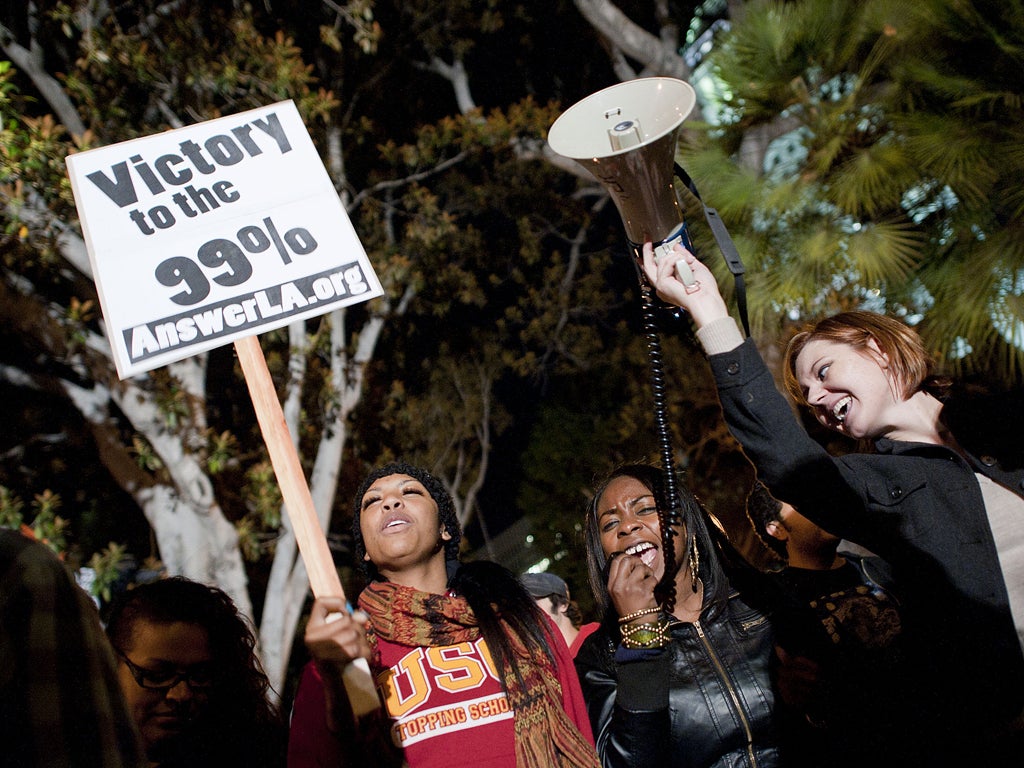Your support helps us to tell the story
From reproductive rights to climate change to Big Tech, The Independent is on the ground when the story is developing. Whether it's investigating the financials of Elon Musk's pro-Trump PAC or producing our latest documentary, 'The A Word', which shines a light on the American women fighting for reproductive rights, we know how important it is to parse out the facts from the messaging.
At such a critical moment in US history, we need reporters on the ground. Your donation allows us to keep sending journalists to speak to both sides of the story.
The Independent is trusted by Americans across the entire political spectrum. And unlike many other quality news outlets, we choose not to lock Americans out of our reporting and analysis with paywalls. We believe quality journalism should be available to everyone, paid for by those who can afford it.
Your support makes all the difference.The city of Los Angeles was still "occupied" last night, as protesters defied an official deadline to clear an encampment where they have been demonstrating since October against America's widening wealth gap.
Riot police descended late on Sunday on the public space surrounding City Hall, where about 400 tents and 800 members of the so-called "99 per cent" have spent the past seven weeks, but officers withdrew after six hours.
They had hoped to enforce an order by the Mayor, Antonio Villaraigosa, for the site to be cleared by midnight. But unlike their pepper-spraying counterparts in other US cities, they were not willing to use extreme force.
A stand-off duly ensued. By dawn yesterday, the City Hall encampment remained untouched but surrounding streets were mostly clear of demonstrators, allowing the Los Angeles Police Department (LAPD) to claim success in preventing major roads from being blocked during Monday's rush-hour.
The pervading atmosphere was cordial and just four arrests were reported during the overnight operation.
There is little sign that protesters can be persuaded to vacate peacefully what is now the largest and longest-established "occupy" site in the US. LA's civic leaders, along with powerful local trade unions, strongly support both the group's right to protest and its aims. Mayor Villaraigosa, a Democrat, has praised the demonstrators for "bringing much-needed attention to growing disparities in our country", and last month even toured the encampment handing out free anoraks to residents.
Over time, however, the authorities have become increasingly concerned about sanitary conditions at the site, on what is officially designated as parkland. Last week, they tried to persuade campers to leave voluntarily, offering to lease them a 10,000 square foot office nearby for the peppercorn rent of $1 a year. Mr Villaraigosa also promised to give the Occupy movement a tract of land on the outskirts of LA, which could be turned into a communal farm.
His office reportedly said the 200 or so protesters who are currently homeless would be offered public housing. The offer was criticised in many quarters – either for being over-generous, or for setting an irresponsible precedent which could be exploited by special interest groups for years to come. But the residents of the Occupy encampment nonetheless refused to accept it.
Many observers were flummoxed by that decision. Even among supporters, there is now, in private, growing frustration at the Occupy movement's failure to leverage a growing profile into concrete achievements. It has no official leadership and is yet to outline a coherent set of policy positions or long-term goals, beyond merely staying put. Under the protocol by which encampments are run, all substantive decisions on future policy must be supported by 90 per cent of residents before they can take effect. Critics say that makes it virtually impossible to achieve consensus on any issue at all.
In cities such as Oakland, generally-supportive civic leaders have duly grown weary of attempting to do business with the protesters, and have instead asked the police to forcibly remove them, with violent consequences.
For the time being, at least, LA intends to learn from their mistakes. "We will enforce the law on our own time, when it makes sense to me as someone responsible for not only the safety of my police officers but for the safety of the people of that park," said the LAPD chief, Charlie Beck.
Subscribe to Independent Premium to bookmark this article
Want to bookmark your favourite articles and stories to read or reference later? Start your Independent Premium subscription today.

Join our commenting forum
Join thought-provoking conversations, follow other Independent readers and see their replies
Comments